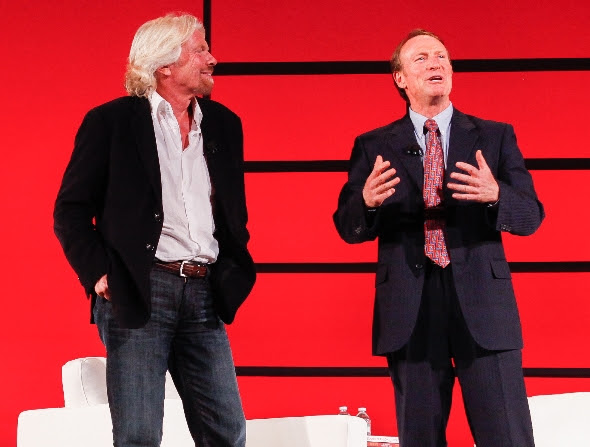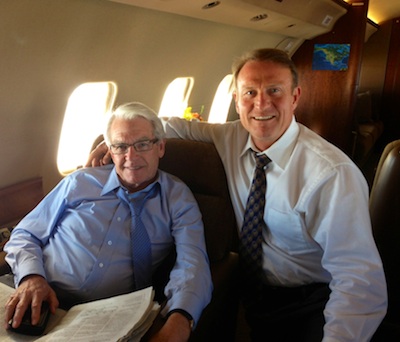“This life, this experience is our one time to be ourselves.
It’s amazing. It’s such an incredible gift.”
– Maya Angelou
Several years ago, Maya Angelou reluctantly invited me to her home for a public broadcasting interview. I say “reluctantly” because at the time, I was the executive producer of Schwab.com and the Schwab CEO series, so Dr. Angelou’s office wondered aloud why a business geek like me wanted to get a front-row seat with Maya to discuss her life and existential poetry. I had been broadcasting interviews with billionaires like Steve Jobs, Michael Dell, Bill Gates and Warren Buffett, and it was time to break out of my comfort zone to interview this remarkable literary pioneer and leader.
On the day I arrived in Wake Forest, NC – Maya had cancelled all her meetings because she wasn’t feeling well. Since I had already made the trip, I told her office that I’d be happy to sit outside her home on that blustery fall day and wait – and if she were feeling well enough anytime that day, that I’d be there and she could allow me the interview if she wanted to. Finally, her assistant took pity and let me wait in her living room, where I could smell freshly-baked cookies, coffee and comfort food. She had a 12-foot picture window looking out to the fall trees, where brilliant yellow, orange and red leaves swirled as though in an aquarium.
An hour later, I looked up to see Maya – a majestic six-foot Amazon – enter the room. She shook my hand and settled into her favorite chair to chat. We talked about kids and love and life, and the 20-minute interview slot turned into four hours of laughter, deeply moving conversation, and lessons that I’d never forget. I think we healed each other that day.
The resulting program was called “Seven Sacred Promises”, and if you’d like to listen to the interview or read a copy of the transcript – you can find one of the chapters at http://www.markcthompson.com/register.php
Here’s an excerpt from our conversation: “This experience, this life, is our one time to be ourselves. It’s amazing. It’s such an incredible gift. The present is a present; it is a gift. To not try to live fully is to say to the creator, ‘I really don’t appreciate this incredible cornucopia. I’m not going to enjoy color, music, or order, or disorder. I just refuse.’ It’s amazing that the creator doesn’t just bump you into being a non-entity.”
“By the time my son was 7, I taught him that there was a place inside himself, so sacred, that no one had the right to walk in there. Nobody. No mother, father, no wife, husband, no child. Because that maybe the place that you go to meet God when you die. That place must be pristine. And it is your responsibility to keep it pristine. So if you don’t, if you allow any brut to come in trashing that place, what happens to you? Where do you go for solace inside yourself? Can’t do that. There is something so sacred in each of us.”
Maya told me that there were customers who would come into her Grandmother’s store and complain about everything. “When that person would leave, she would call me. ‘There are people all over the world, white and black, rich and poor, going to sleep when that person went to sleep. They will never wake again. Their beds have become their cooling boards, their blankets have become their winding sheets and they would give ANYTHING for just 5 minutes of what that person was complaining about.’”
What I wouldn’t give for 5 more minutes with the late, great Maya Angelou. I’m so thankful for the gift of the time I shared with her – and her spirit will live on in her words for the ages. Rest in Peace Maya.
Listen to the rest of Mark’s interview with Maya Angelou:
http://www.markcthompson.com/register.php






 I had an amazing day last week – I rode with my mentor Charles “Chuck” Schwab, who I worked with for over 12 years in the early days of Schwab when the company was growing rapidly and we took the company public. I was accompanying him on his private jet to visit locations where he has been highly involved in museums and arts education – a cause that is important to both of us. I’ve also spent time with him on causes like dyslexia – another common cause which we are both passionate about. Chuck is dyslexic – in fact, he was almost kicked out of college twice. He had incredibly difficult challenges early in his career starting businesses and keeping them afloat until he realized that the key to his success would be reaching out to others who had strengths that complemented his weaknesses.
I had an amazing day last week – I rode with my mentor Charles “Chuck” Schwab, who I worked with for over 12 years in the early days of Schwab when the company was growing rapidly and we took the company public. I was accompanying him on his private jet to visit locations where he has been highly involved in museums and arts education – a cause that is important to both of us. I’ve also spent time with him on causes like dyslexia – another common cause which we are both passionate about. Chuck is dyslexic – in fact, he was almost kicked out of college twice. He had incredibly difficult challenges early in his career starting businesses and keeping them afloat until he realized that the key to his success would be reaching out to others who had strengths that complemented his weaknesses.